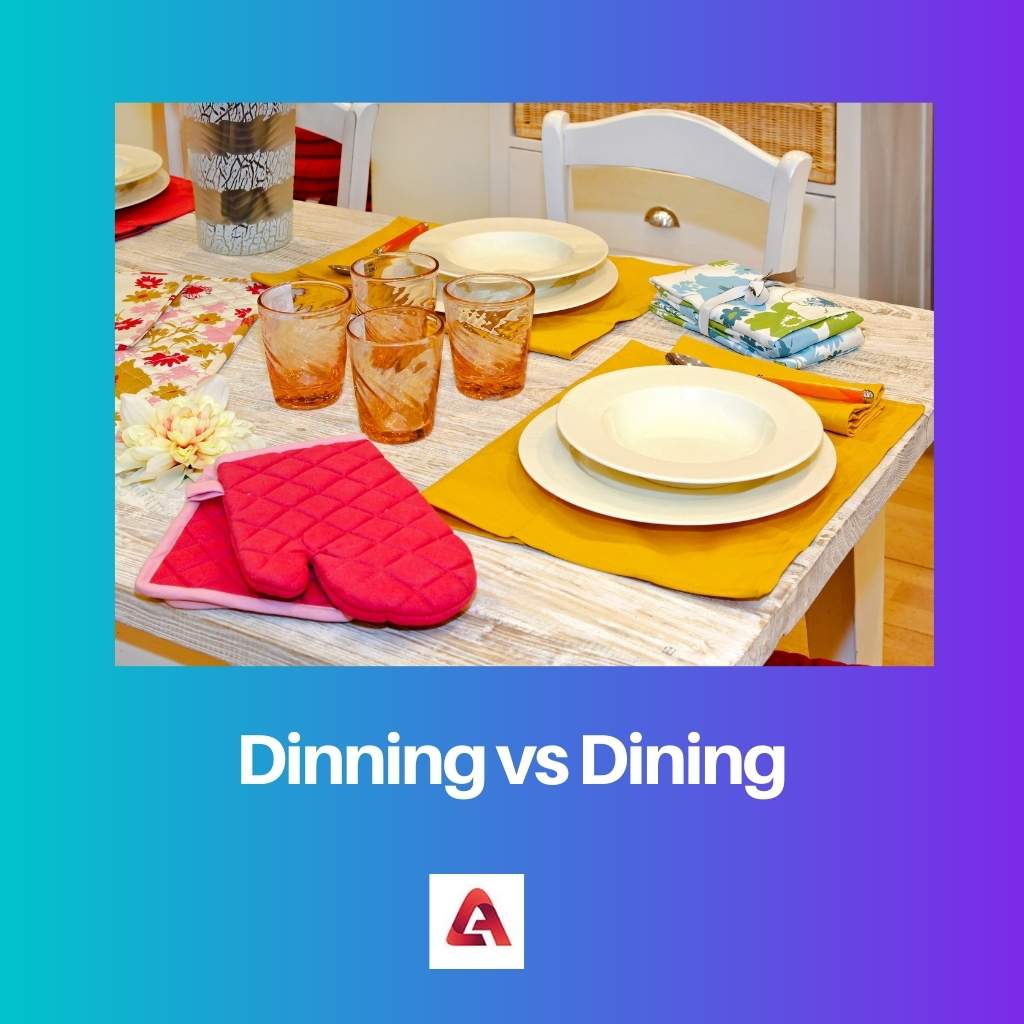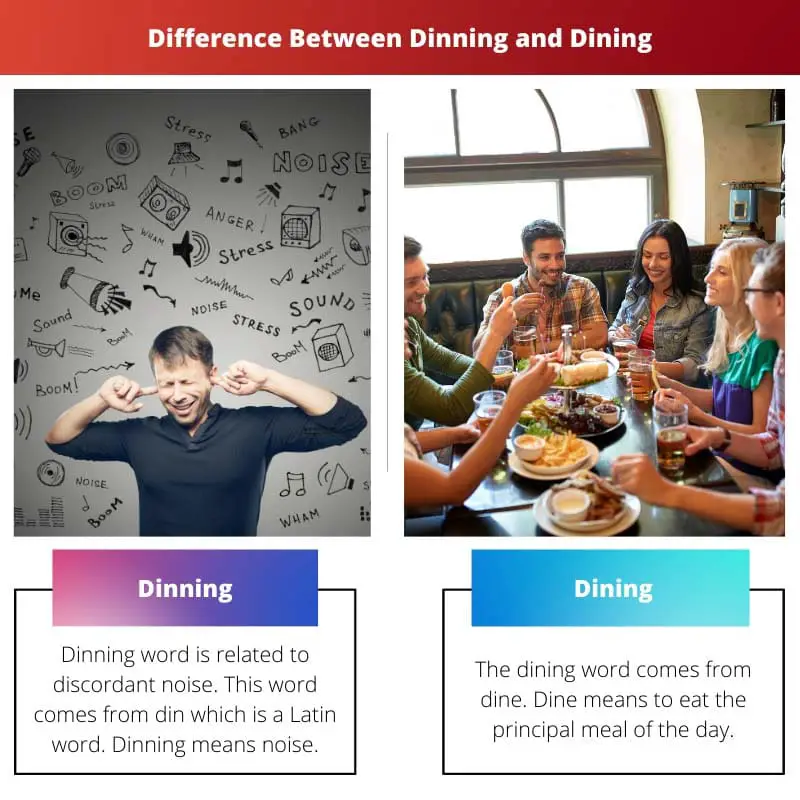Dinning and dining, these two words that are very similar to each other. If we pronounce them together, it will create confusion. There is a slight difference in the spelling of these two words, but they are not the same.
They have different meanings. And their meanings are also so different that there is no relation between them.
Key Takeaways
- “Dinning” means creating a loud, continuous noise, while “dining” pertains to eating a meal.
- Dining can be unpleasant and distracting, particularly during a dining experience.
- Dining etiquette emphasizes creating a pleasant atmosphere by avoiding loud noises, such as “dinning” at the table.
Dinning vs Dining
The difference between dinning and dining is that dinning refers to any kind of verbal sound or any loud sound, whereas dining is directly related to a meal or eating dinner. There is only one difference in spelling, and that is extra n in Dinning, however, if we look at the meanings, we cannot lump them together. There is no connection between food and loud noises.

Dinning is related to noise. It’s a loud rumble. A sound that does not affect our ears in a good way. For example, if a group of people gathers in a hall, that group will surely make a loud noise which will not be obvious. And it’s called dinning. An unpleasant sound that is not clear or causes confusion.
Dining is far different from dinning in meaning. Dining is the activity of having a meal. Dining is related to dinner. This word is used when someone wants to entertain their loved ones by inviting them to dinner to show their love for them.
Generally, it is an act of eating dinner as a social function.
Comparison Table
| Parameters of comparison | Dinning | Dining |
|---|---|---|
| Definition | Dinning is related to loud noise. It is a kind of discordant sound. It means to stun with deafening noise or to instill by wearying repetition. | Dining is related to food. It means to eat the principal meal of the day or to entertain at dinner. This word is related to dinner. |
| Etymology | Originated from the word Din and was first used in the 10th Century. | Originated from the Middle English word dinen and was first used in the 13th century. |
| Purpose | To describe any kind of unpleasant noise | To describe a group of people or a person having dinner. |
| Related Terms | Mouthing, echoing, hammering, chiming are some of the related words to dinning | Dining car, dining table, dining room are some of the words related to dining. |
| Example | I could hardly hear anything above the din in a coffee house | Lunch was served in the dining room. |
What is Dinning?
Dinning word is related to discordant noise. This word comes from the din, which is a Latin word. Dinning means noise. In Middle English, it is known as dine, whereas, in Old English, it is called dyne. Both have the same meaning. There is no certain origin of this word.
It would be appropriate to consider loud as a synonym for dining as both have the same meaning. In the noise, the person does not hear the voice clearly, which makes it difficult for him. And in such a situation, there can be a bad effect on our ear screen, which is not good for us.
Dinning is a verb that means to make noise. It comes from the din. Din is first heard before 900, which is the Middle English word dine, which is a noun. In old English, dynn or dyne word is known for it.
In old High German, the word tuni is used, and in Sanskrit, the word dhuni is used, which means roaring. So this is how this word originated.
There are so many synonyms for this word. For this unpleasant and prolonged noise, we can use blare, blast, clang, clatter, crash, clamour, etc. This word sometimes creates confusion with dining. But don’t get confused because both words have different meanings.

What is Dining?
The dining word comes from dine. Dine means to eat the principal meal of the day. Dining is a verb form of the word dine, which is used with an object. When someone has their main food, this word is used from many perspectives.
For example, if you are close to someone, then food is just a way to show your feeling towards your loved one. You can take your loved one on a dinner date. People also invite their relatives to dinner just to show their love towards them.
Dining words are used with many objects. It seems like a dining room, dining hall, dine-in, etc. We also use this word in restaurants when we eat out with our family. Therefore it can be used in many ways. But overall, it is directly related to food which cannot be ignored.
The origin of this word is not certain. The period is assumed to be 1250 -1300. The word dine is first heard in Middle English as dinen, which is also the same in Anglo-french.
In Old French, this is known as di(s)ner, which is vulgar. The other word from dine is pre. dine, which is a verb used without objects, and pre.din.ed or pre. dining.

Main Differences Between Dinning and Dining
The word Dinning and Dining are very alike in both sound and spelling. Over the internet or sometimes in books, we could have seen Dinning word used in the sense of having dinner or dining table, which is wrong. The meaning of both words is different.
The main differences between the two are the following:
- Dinning is majorly focussing on loud noise whereas Dining is related to principal meals
- Dinning was in use earlier when compared to Dining in English dictionaries.
- Though they look similar in their spelling, Dinning is obsolete while Dining is used even today.
- Dinning word originated from the word Din while Dining originated from the word dinen.
- Dinning word was first heard in the 10th century and most used in the 18th century, whereas Dining was first heard in the 13th century.
